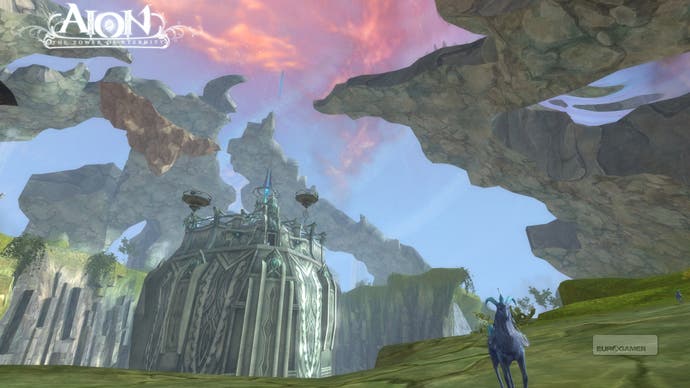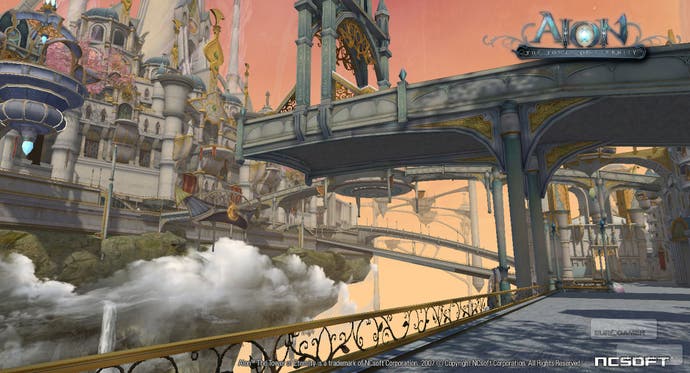Aion: The Tower of Eternity
From here to eternity?
There's no shared content between the races outside of the Abyss, leaving you one, largely linear path to take through the levels. You can start a character of the opposing faction on a different server, but what you find there will be a startlingly similar re-skin of the questing you've already done. Elysium and Asmodae are almost mirror worlds.
Despite the division of your adventuring into a mandatory Campaign thread and regular, optional quests, there's little choice. There's enough to cover your levelling, but only just, so you'll need to do almost every task you're given if you want to avoid pure grinding - and many of the quests are just disguised grind. Diversions from standard-issue kill-counts and measly drop-rates are rare, and you do occasionally hit walls of tough or group-only content that can be tricky to pick your way around or slog through if you insist on soloing. It's a narrow experience.
A good job, then, that the set-dressing is so opulent. There's reams of quest text - puffed up with hot air, but not without charm, and the context and care taken in sketching out the details of this foreign fantasy world is welcome. The striking settings - with their rich, humorous ecology, colourful and cosmopolitan races and fantastical, sometimes haunting atmosphere - are nicely varied and a pleasure to explore. Atreia is a great place to spend time: a vital, but still quite rare quality for an online world.
The easy luxury of the presentation extends to Aion's brilliant user interface: it's quick, clean, comprehensive, comfortable and fuss-free. No mean feat at all in MMOs, a field of gaming which verges on having the same stringent usability requirements as office software.

Combat - at least as far as the feel is concerned - is tight as a drum. Skills execute immediately with bright, punchy sound effects and swift animations. There's a satisfying crispness, a moreish, Pavlovian, knee-jerk enjoyment to key-pounding the relatively hardy monsters into the dust. It turns out that's just as well, because it's all sheen; the depth is an illusion, a reflection in its brightly polished surface.
Although the skills are intuitive, their effects are quite basic, and there's little interaction between them or with the behaviour of enemies or other player classes. Your tactics almost never alter beyond the slotting in of new skills, the lengthening of certain rigid combos, as you level up. With few utility or escape abilities available, opportunities to think on your feet are scarce, and getting out of trouble depends on luck and bloody-minded persistence rather than imagination or skill. Pop your consumables, hope the percentage game plays out in your favour, and stick to your rotation. 2, 2, 3, 3, 5, 2, 3, 4, 5.

Aion's deep-seated conservatism is also evident in the class design. The eight classes - four initially, with a secondary choice at level 10 - are rigidly traditional, with next to no hybridisation or original features at all, apart perhaps from the Chanter, a buff-merchant with adequate skills in both combat and healing. They're all solidly effective (and making the healers relatively durable, with mail armour, is a nice touch) but stolidly unimaginative. This situation is relieved when you get access to the Stigma system later on in the game, allowing you to collect and equip certain skills from other classes or later levels like loot. It's rewarding customisation, but not a substitute for class design that's interesting at its root.
Your class choice at level 10 - at which point your character recovers from a bout of amnesia and remembers it's a Daeva, a kind of demigod - comes with a couple of other perks. The first, famously, is a pair of wings, but these are of very limited use until you reach the broken, floating landmasses of the Abyss later in the game; flight is restricted to certain areas and on a short timer. The second is a class-specific super-ability with its own resource, Daeva Points, which you grind up slowly through combat. It's a useful get-out-of-jail card, and a well-judged death penalty - losing your Daeva Points when you die stings your pride more than it hampers your progress. You lose a little XP too, which can be bought back for cash.

